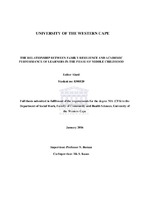The relationship between family resilience and academic performance of learners in the phase of middle childhood
Abstract
Family resilience has a positive bearing on the academic performance of learners in the developmental phase of middle childhood. The role of family is often ignored and so there is a gap in the literature on the link between positive academic performance and family resilience. The aim of the study was to examine the relationship between perceived family resilience and the academic performance of children in the phase of middle childhood. A quantitative methodological approach was employed in this study with a cross-sectional correlational design. The type of sampling used in this study was convenience sampling. Three primary schools were selected and participants at the schools were randomly selected. The sample consisted of N = 194 Grade 6 learners from schools in the Penlyn Estate area. The reason for having chosen Grade 6 learners was that they are on the brink of puberty and have a good idea of how things function within the family and they were therefore better able to verbalise their opinions than were the younger learners in the phase of middle childhood. The data was collected using a self-reported questionnaire that included the demographic information and
the Family Resilience Assessment Scale, as part of the quantitative methodology. The data was then analysed using the Statistical Package for Social Sciences V23 (SPSS). The results were provided using descriptive and inferential statistics. Participation in this study was voluntary after being well informed, while confidentiality and anonymity were maintained throughout the study. The results show that there is a significant positive relationship between the dimensions of academic performance and family resilience.

